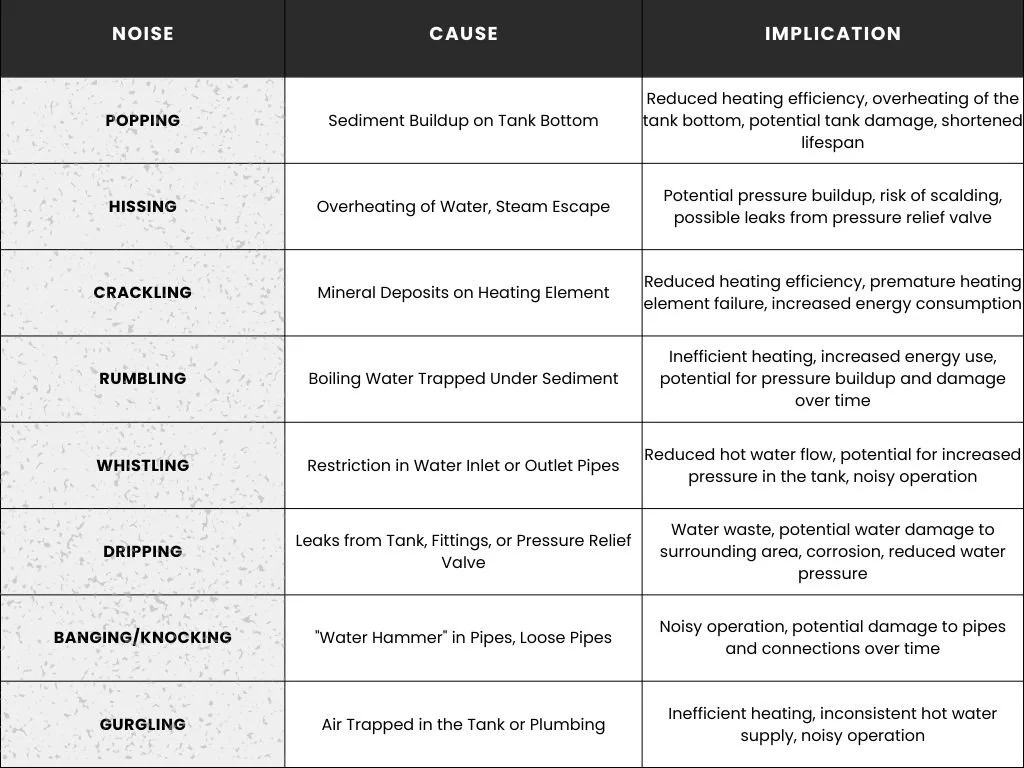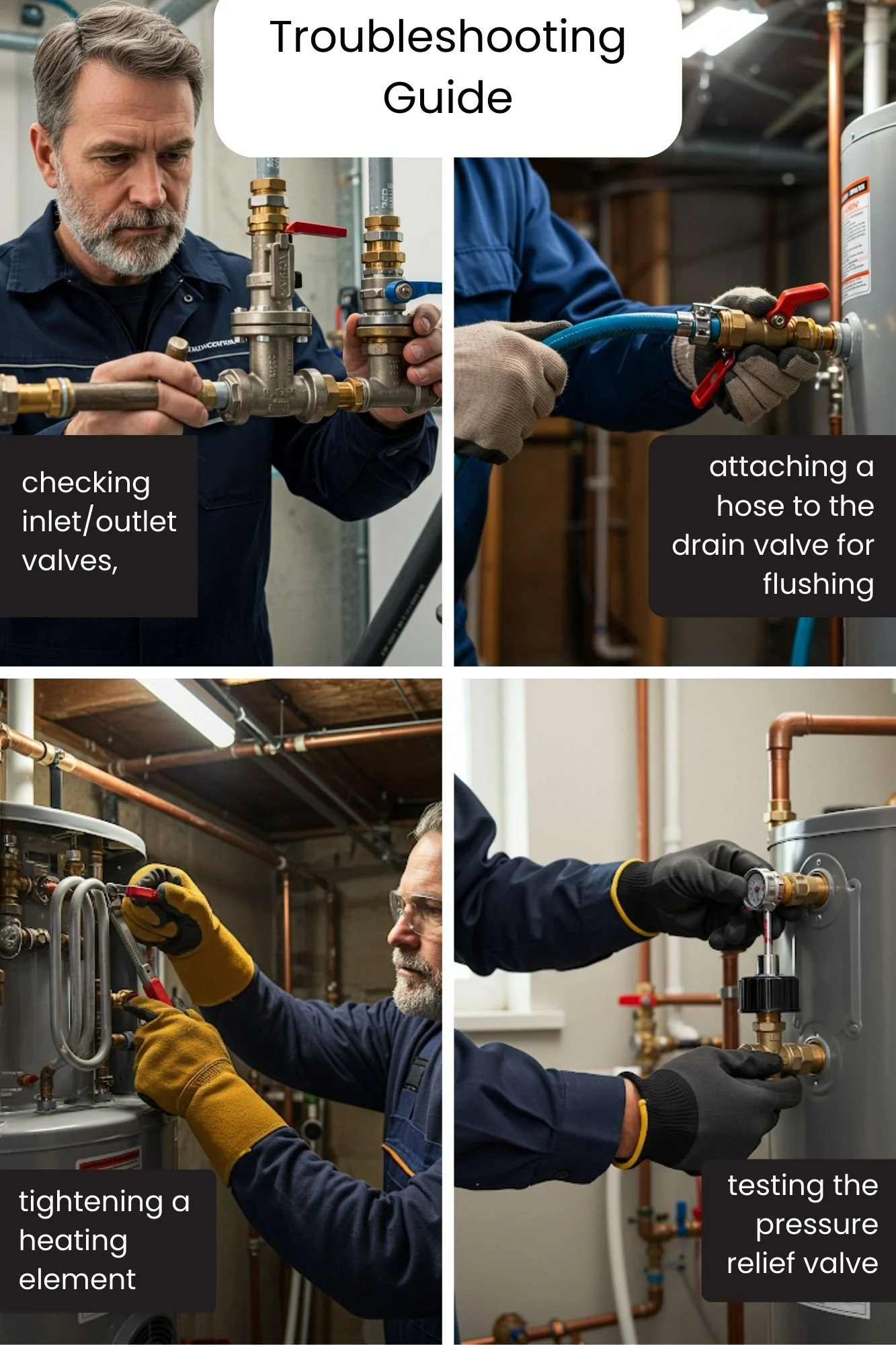Why is My Water Heater Making Noises: What They Mean
You didn’t ask for drama — but your water heater making noise at 11:47 PM clearly has other plans. A pop here, a hiss there, maybe even a metal-on-metal screech that sounds like your pipes are auditioning for a horror film. You pause. You wait. It keeps going. And now it’s your problem.
Most folks brush it off — “It’s just the heater doing heater things,” they say. Until one day, it’s not just noise. It’s rust in the water. Or a bloated power bill. Or a tank leak big enough to rinse your garage floor.
Look, your water heater isn’t being “quirky.” It’s giving you clues — and ignoring them doesn’t make you chill, it makes you one warranty clause away from regret.
Let’s break down what those sounds really mean, what you can handle on your own, and when it’s time to call in someone who actually knows what’s boiling.
Common Water Heater Noises and Their Causes
So, your hot water heater’s making noise. Weird ones. The kind that has you standing in the hallway at 2 a.m. wondering whether to call a plumber or an exorcist. Look: it’s probably not haunted. But it’s definitely trying to get your attention — in the most annoying way possible.
Let’s decode what these sounds mean before you start Googling “do water heaters explode.”
Popping or Crackling
What it sounds like: Like someone poured Rice Krispies into a jet engine.
What’s really going on:
You’ve got a layer of sediment sitting at the bottom of your tank— even when things start boiling. When that burner fires up, the water underneath the sediment superheats and bursts through in tiny explosions. Hence the racket.
Why you should care:
That innocent-sounding hot water heater kills efficiency, shortens the lifespan of your heater, and over time, may lead to pressure buildup that your tank really wasn’t designed to handle.
Fix it or face it:
Flush the tank. Not next month. Now. If sediment keeps coming back, your water’s too hard and you’ll want to deal with that or replace your water heater every few years.
Whistling or Screeching
What it sounds like: That sound you hear when steam shoots from a kettle. Except… your heater isn’t a kettle.
Why it happens:
You’re hearing a water heater whistling because something’s narrowed the water’s path. Like scale buildup, or a valve that someone “half-closed for safety” and forgot. Water’s trying to squeeze through like toothpaste through a pinhole.
What it means:
It’s a pressure red flag. That screeching is your heater’s way of telling you it’s under more strain than it was designed for.
Don’t ignore this one:
Check your inlet and outlet valves — make sure they’re wide open. If that doesn’t stop the whistle, it’s begging for maintenance.
Rumbling
What it sounds like: A distant thunderstorm.
What's really happening:
This is just another side effect of that sediment buildup. Water trapped beneath crusted gunk starts to boil. Not heat. Boil. Which sends vibrations through the tank.
Why you care:
Boiling water trapped under minerals creates pressure. Pressure stresses components. Stressed components fail. That rumbling noise is a slow countdown.
Solution:
Tank flush again. Or replace your water heater if this is your second rumble and the thing’s pushing a decade in age.
Knocking or Banging
What it sounds like: A drunk raccoon trapped in your walls.
The culprit:
This one’s the classic water hammer — a sudden stop in water flow slamming through your pipes like a mini tidal wave. It can also happen from thermal expansion or loose plumbing.
Not just annoying:
It can bust pipe joints, damage valves, and send your plumbing system into therapy. If your heater's older or your pipes are unanchored, this is warning shots.
What you can do:
Install arrestors. Secure loose pipes. Or have someone with a wrench come take a look.
Humming
Some electric heaters hum because the heating elements are vibrating — often because they’re loose. This one’s typically more annoying than dangerous.
Should you panic?
Not really. But do get it tightened before it wears out or shakes itself into misalignment.
Water Heater Making Noise When Water Is Off — What’s With That?
This one confuses people. But here’s the deal:
Even when no one’s using hot water, the heater still cycles to maintain temp. And inside the tank, temperature changes cause expansion and contraction, which can sound like creaking, ticking, or even popping.
So is it normal?
Sometimes. But if it’s loud, regular, or changing, your heater might be trying to tell you something. Pay attention. Constant sounds from an idle tank can mean sediment, failing valves, or thermal stress building up.
Why Do Water Heaters Make Noises?
Water heaters are glorified metal pots that boil water for a living. It’s a high-pressure job — literally — and when something’s off, they don’t whisper about it. They rattle, whine, groan, and scream.
You don’t have to guess. Here’s where 95% of the noise complaints come from:
1. Sediment Buildup
We’ve already dragged sediment, but we’ll do it again. It’s the number one cause of water heater noise, especially if you live in a hard water area (which, statistically, you probably do). The longer it sits, the worse it gets.
The U.S. Geological Survey confirms most homes have hard water, and sediment is a known side effect (USGS Water Science School).
2. Thermal Expansion
When water heats up, it expands. When it expands inside a confined metal container, stuff starts to flex, creak, and occasionally thud. That’s thermal expansion. And if your system isn’t fitted with an expansion tank, you’re forcing it to improvise.
3. Loose or Failing Components
Heating elements, pipe joints, pressure valves — they wear out. Or they get loose. Either way, things start vibrating. And vibrating metal parts don’t whisper.
4. Valve or Pressure Issues
This one ties directly back to the water heater whistling issue. When the valves aren’t fully open, or your pressure relief valve isn’t, well… relieving anything, noise follows. Pressure imbalance can strain the entire system — and lead to bigger, wetter, more expensive problems.
You might be thinking: “But some noise is normal, right?”
Sure. While some noises are harmless, persistent or loud sounds warrant attention. For a broader understanding of potential water heater issues, refer to our article on 8 Common Water Heater Problems.
Troubleshooting Water Heater Noises
Let’s be honest: you shouldn’t need a degree in mechanical engineering to figure out why your water heater is making a knocking noise at 3am. And yet, here we are.
Sometimes, the fix is laughably simple. Other times, it’s the kind of problem that’ll cost you twice because you waited. Here’s how to troubleshoot the madness — like someone who actually knows what they’re doing.
1. Check the Valves
If your water heater is whistling like a kettle on edge, one of the first things to inspect is whether the inlet or outlet valves are partially closed. No, not sorta closed. Not maybe closed. All the way open or all the way shut — anything in-between creates turbulence, and turbulence creates that high-pitched annoyance that’s been driving you insane.
What to do:
Open the valves. Fully. If it’s still shrieking at you, move on to the next step.
2. Flush the Tank
If your water heater is making a popping noise, it’s probably not haunted. It’s just boiling water underneath a layer of mineral gunk you’ve ignored for too long.
Over time, minerals in hard water settle at the bottom of your tank. And every time the heater kicks on, that water bubbles under the sediment and explodes upward. That’s what you’re hearing.
How to flush it (safely):
Turn off power (or gas). Don’t skip this. No electricity and no flame while working.
Connect a garden hose to the drain valve and run it outside (or to a bucket).
Open the valve and let the water drain out. If it looks like sand soup, you’re on the right track.
Open the cold-water supply for a few seconds to stir leftover debris.
Drain again. Close the valve. Remove hose. Refill the tank.
Turn power/gas back on.
Do this once a year and you’ll likely never have to search “how to replace your water heater prematurely” again.
3. Inspect Components (the hum is not “just how it is”)
So, your hot water heater is humming like a bored bee. That’s a sign that your heating element might be loose. Loose means it’s vibrating. Vibrating means it’s wearing out. And wearing out means your tank is aging faster than it needs to.
What to do:
Tighten up the heating elements (with the power off, always). Check brackets or straps on surrounding pipes too. If you hear banging or your water heater is making a knocking noise, that could be a loose pipe knocking around during thermal expansion or water hammer.
4. Test the Pressure Relief Valve (the “do not mess with me” part)
The temperature and pressure relief valve (TPR) is the only thing standing between you and an overpressurized tank. If it's failing, things go from weird sound to worst-case scenario real fast.
How to test:
Gently lift the lever. Water should flow out briefly. If it doesn’t? Or if it leaks continuously afterward? That valve’s toast.
Safety Note:
If you're unsure what you're doing, back away from the tank. Some things really are better left to reliable plumbing experts — especially when they involve 150+ PSI of steaming water in a metal drum near your kids’ bedrooms.
When to Call a Professional
Let’s call it what it is — not everything should be DIY’d. If you’ve done all the above and your heater’s still doing its interpretive dance of dread noises, or worse, leaking? Don’t play contractor. Pick up the phone.
Persistent noises
Signs of water damage or leaks
A heater older than your last car
You’re unsure what to touch without electrocuting yourself
That’s your cue to call reliable plumbing experts who do this every day (not just on weekends between fantasy football drafts).
Preventing Water Heater Noises
Here’s a thought: don’t wait until your heater sounds like it’s about to file a grievance. Noise is usually the final warning — not the first.
Maintenance may sound boring. But so does “paying $1,900 to replace your water heater because no one told you flushing it once a year could’ve bought you five extra years.”
Preventive Tips Worth Actually Doing
Flush your tank annually. Yes, every 12 months. This removes sediment and dodges the whole “water heater making popping noise” scenario.
Check your valves and fittings. Loose components hum. Failing valves screech. Both are entirely preventable.
If you live in a hard water area, install a softener. It’s the only way to reduce mineral scale buildup without cutting off your water supply.
Have it inspected every 1–2 years. Pro eyes will catch problems early — before your tank starts reenacting Die Hard in your utility room.
Why It Matters
Look — this stuff isn’t glamorous. But here’s what’s on the line:
A quieter, more efficient system
A longer lifespan (no rushing to replace your water heater when it's only 6 years old)
Lower energy bills
And zero weird noises at 2:14 AM that make you wonder if your plumbing’s developing sentience
Conclusion
Let’s not pretend you needed a master's degree to know something was off. Whether it’s your water heater making a popping noise, a high-pitched screech, or an obnoxious banging like someone’s stuck inside trying to claw their way out — the tank was trying to say something.
And now you know what.
Some of these issues are dead simple. Others? Not so much. The moment your DIY fixes stop working, or you hear something new — louder, sharper, dumber — that’s not the time to Google harder. That’s the time to call someone who gets it.
We mean someone who won’t upsell you on a full replacement unless it’s really time to replace your water heater. Someone who’ll flush, inspect, tighten, and only recommend what you actually need.
That’s what we do at Spotless Plumbers. We’re here for the weird knocks, the stubborn sediment, and the stuff that sounds like a UFO is landing in your utility closet.
If you're hungry for more straight-up advice, don’t miss our no-nonsense breakdown: 8 Common Water Heater Problems. You’ll be glad you checked.
Frequently Asked Questions
-
Yes—while not all noises signal danger, consistent or loud sounds often point to sediment buildup, loose components, or pressure issues. Ignoring them can reduce efficiency or even damage the tank. It’s best to check it early to avoid bigger problems.
-
A failing water heater may make popping, rumbling, or banging noises. These usually mean internal parts are struggling—often due to sediment, worn heating elements, or pressure problems. If the noises get worse or are paired with poor heating, replacement could be near.
-
Loud sounds often come from boiling water trapped under sediment, loose pipes, or malfunctioning valves. These issues build up slowly but can lead to costly repairs or failure if left unchecked. It’s a signal your system needs attention now—not later.
READ MORE…
How Does Plumbing Work? What Your Plumber Knows That You Don't
Top 10 Reasons for Low Water Pressure in Your Home
The Ultimate Guide to Fixing a Leaky Sink Drain Pipe



